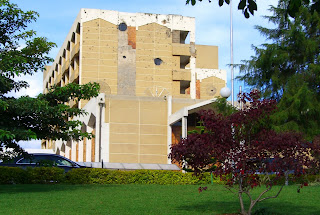Even though we don’t have a direct personal connection to the Genocide, we were curious about the mourning process for those left behind. We can’t imagine experiencing such an atrocity in our own lives, but when you sit with others who are suffering, the pain is palpable.
We noticed our hearts feeling nervous on the morning on April 7th because we didn’t know what to expect. People told us that the large gathering at the stadium last year was a traumatic experience due to the wailing and screaming of people in mourning. We were nervous about experiencing such intense sadness. It is almost as if people bottle up their sadness until this time of year when it explodes like a broken dam. How would people feel about mzungus mourning with them? What posture should we take? Do we remain silent? Do we ask questions to learn and to remember those lives that were stolen? We landed on simply showing up and being present. The most comfortable posture for us was one of a listener.
Our experience was not completely in line with the feedback we have heard about last year. It was true that life was different on April 7th but the mourning wasn’t as disturbing as people described. Kigali felt like a ghost town. There was an eerie quietness, almost like the silence after a huge snow fall when all sound seems muted. We noticed fewer women on the street, less meet and greet between pedestrians, many people carrying kerchiefs in their hands as they went to and fro, fewer vehicles on the road, all businesses shut down, closed doors and windows, and lots of purple and black clothing. Purple is the color of mourning in Rwanda.
The main event we participated in was called “A Walk to Remember.” Here is a news article about the event in you are interested: http://allafrica.com/stories/201004080155.html This was a movement all over East Africa to stand against genocide ideology. People in the capitols of Kenya, Burundi, Tanzania, and Uganda all walked in solidarity with people in Rwanda. The walk in Kigali started at the Parliament building for its significance of being one of the first buildings attacked on April 7, 1994. Today, you can still see the gun shots and grenade wounds on one side of the building so that no one forgets what happened.
President Paul Kagame made an appearance to address the crowd with some encouragement. He directed his thoughts to the younger people reminding them that they are the future of Rwanda and the responsibility that comes with that position. He encouraged them to dream big, to strive for higher education and to be agents of change. He empowered everyone to stand together as unified Rwandans in hope for a brighter future. It was a very powerful experience to join about 8,000 people from all different backgrounds (although mostly Rwandans) for a walk to the National Amahoro Stadium. What is usually a very busy street connecting our neighborhood, Kacyiru to the next sector called Remera, was closed for this event. When we arrived at the stadium we formed a large circle around the field holding hands in unity. There were many singers, both solo artists and choirs singing in Kinyarwanda. We heard many readers perform poems and inspirational readings. A group of children from Uganda read a list of names belonging to Tutsis who were murdered 16 years ago. There was also a large bon fire blazing in the night. We finished with a candlelight vigil accompanied with music that was a stunning sight. We expected a packed house but much to our surprise, it was only about 70% full. Perhaps more people showed up after 7pm when we made our exit to attend to an anxious dog.
Overall, I think we can say we will never understand loss at this level. Our perceptions, reflections and emotions still feel far away from the rawness of the Rwandan Genocide . We struggle with feeling removed while our friends and neighbors are dealing with something very real, something central to their identities. While we may notice patterns, participate in activities or learn more from movies, our presence is all we have to contribute.
Imana ibarinde kandi ibahe umugisha







No comments:
Post a Comment